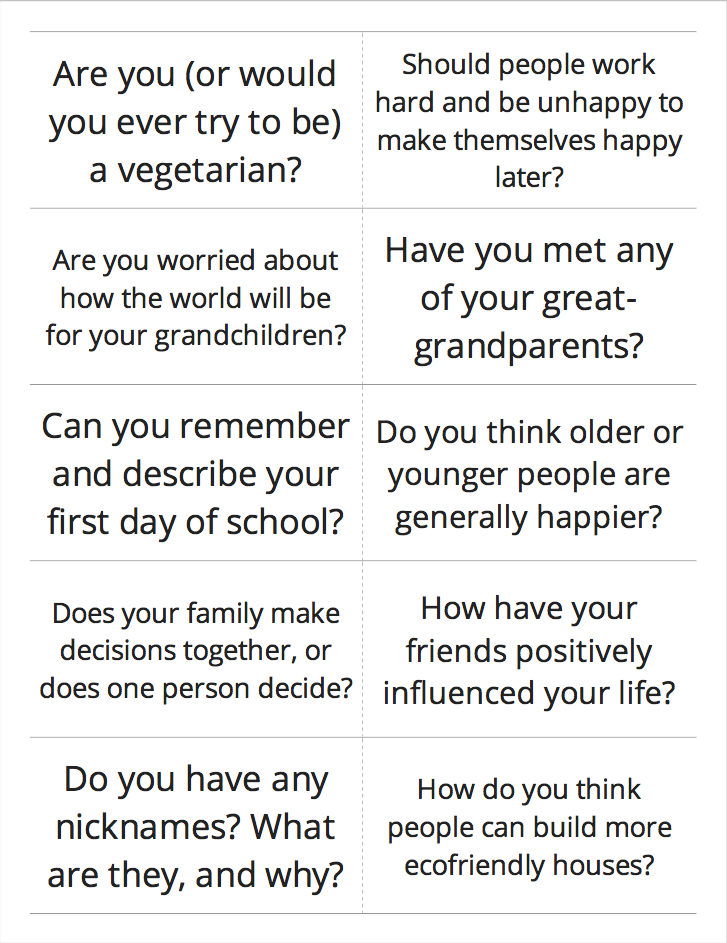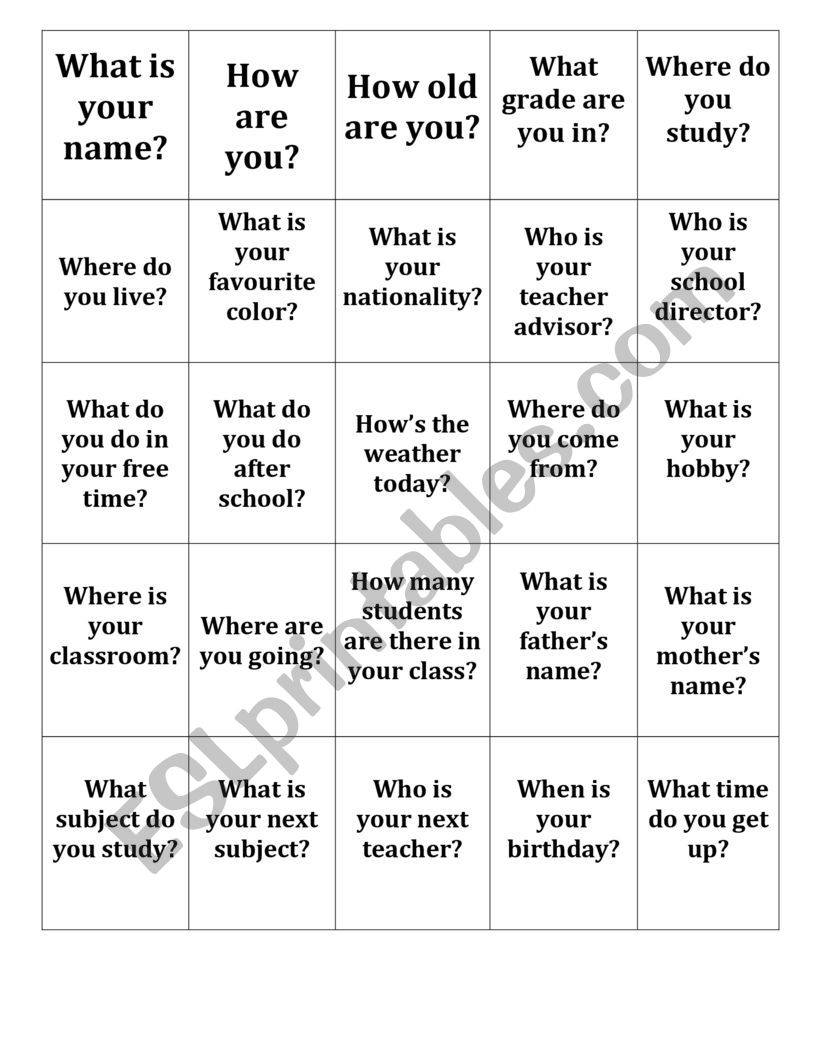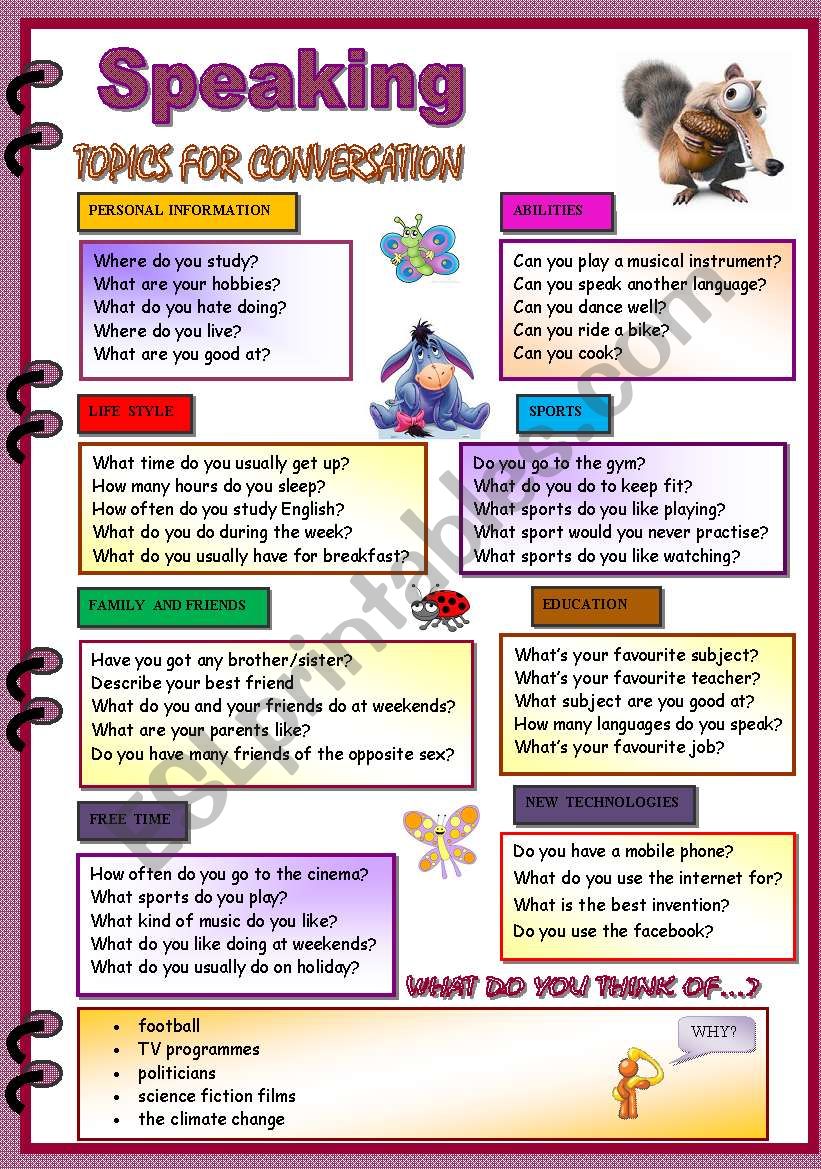
Unlocking Fluency: Essential Adult ESL Conversation Questions for Beginners
For adult learners of English as a Second Language (ESL), the journey to fluency often feels like a daunting climb. While grammar rules and vocabulary lists are crucial, true progress and confidence blossom through conversation. Speaking, even with limited words, is the bridge from theoretical knowledge to practical application. However, many beginners grapple with anxiety, fear of making mistakes, and simply not knowing what to say. This is where a well-crafted set of Adult ESL conversation questions for beginners becomes an invaluable tool.
This comprehensive guide will delve into why conversation is paramount for adult ESL beginners, the principles for crafting effective questions, and provide a rich collection of Adult ESL conversation questions for beginners across various themes. We will also explore strategies for facilitating engaging and productive conversational practice, ensuring learners can take their first confident steps towards genuine communication.
Why Conversation Matters for Adult ESL Beginners

Before diving into the questions, it’s essential to understand the profound impact of conversation on a beginner’s learning journey:

- Builds Confidence: The act of successfully conveying a message, no matter how simple, is a huge confidence booster. It transforms abstract knowledge into tangible achievement, reducing the fear of speaking.
- Activates Passive Knowledge: Learners often have a larger receptive vocabulary (words they understand) than productive vocabulary (words they use). Conversation forces them to retrieve and use words and grammatical structures, moving knowledge from passive to active.
- Improves Fluency and Pronunciation: Regular speaking practice helps learners articulate thoughts more smoothly, reduce hesitations, and refine their pronunciation and intonation.
- Develops Listening Skills: Conversation is a two-way street. Learners must listen actively to understand questions and responses, thereby improving their comprehension in real-time.
- Reduces Anxiety: The more beginners speak in a supportive environment, the less intimidating the language becomes. It normalizes mistakes as part of the learning process.
- Connects Language to Real Life: Conversation moves learning beyond textbooks and into practical, everyday scenarios, making the language more relevant and meaningful.




Principles for Crafting Effective Adult ESL Conversation Questions for Beginners
Not all questions are created equal, especially for beginners. To be effective, Adult ESL conversation questions for beginners should adhere to certain principles:

- Simplicity is Key: Use basic vocabulary and simple grammatical structures (e.g., present simple, "be" verbs, basic adjectives). Avoid complex tenses, idioms, or nuanced vocabulary.
- Relate to Personal Experience: Questions about daily life, hobbies, family, and preferences are easy to answer because learners are the experts on their own lives. This reduces cognitive load and allows them to focus on the language.
- Encourage Short, Manageable Responses: While open-ended questions are generally preferred for intermediate learners, beginners might benefit from questions that allow for one or two-word answers initially, gradually progressing to short sentences.
- Be Open-Ended (Where Possible): Avoid too many "yes/no" questions. While they can be a starting point, questions that prompt a bit more detail (e.g., "What is your favorite… and why?") encourage more speaking.
- Be Non-Intrusive and Culturally Sensitive: Ensure questions are appropriate and respectful of learners’ backgrounds and personal boundaries.
- Allow for Follow-Up Questions: Good questions can lead to natural follow-up questions from the facilitator or other learners, extending the conversation.


A Collection of Adult ESL Conversation Questions for Beginners
Let’s dive into some practical Adult ESL conversation questions for beginners, categorized for ease of use and progressive learning. Remember to model answers first and provide plenty of positive reinforcement.
1. Personal Information & Introductions
These questions are perfect for the very first interactions, helping learners introduce themselves and share basic facts.
- What is your name?
- Where are you from?
- Do you live in [current city]?
- What is your job? (Or: Are you a student?)
- Do you have a big family or a small family?
- Do you have any brothers or sisters?
- What is your favorite color?
- How are you today?
- What is your phone number? (Practice numbers)
- What is your email address? (Practice letters)
2. Daily Routines
These questions help learners talk about their everyday lives, practicing verbs of action and time expressions.
- What time do you wake up?
- What do you do in the morning? (e.g., "I eat breakfast.")
- What do you do after work/school?
- What do you usually eat for breakfast/lunch/dinner?
- What do you do on weekends?
- Do you like to cook?
- What time do you go to bed?
- Do you watch TV in the evening?
- Do you listen to music?
- Do you exercise?
3. Hobbies & Interests
Exploring leisure activities allows learners to share personal preferences and expand their vocabulary related to free time.
- What do you do in your free time?
- Do you have a hobby? What is it?
- What kind of music do you like?
- Do you like to read books? What kind?
- Do you like movies? What is your favorite movie?
- Do you like sports? What is your favorite sport?
- Do you like to go to the park?
- Do you like to go shopping?
- What is your favorite animal?
- What makes you happy?
4. Food & Drink
Food is a universal topic and often a comfortable starting point for conversation.
- What is your favorite food?
- Do you like coffee or tea?
- Do you like to try new foods?
- What did you eat yesterday?
- Do you like to eat at restaurants? What kind of restaurant?
- Can you cook? What can you cook?
- What is a popular food in your country?
- Do you prefer sweet or salty snacks?
- What do you drink when you are thirsty?
- Do you like fruits or vegetables more?
5. Travel & Places
Simple questions about travel can open up discussions about different cultures and experiences.
- Do you like to travel?
- Where do you want to travel in the future?
- What is your favorite place in your city/town?
- Have you visited another country? Which one? (If yes)
- Do you like to go to the beach or the mountains?
- What is the weather like today?
- What is your favorite season? (Spring, summer, fall, winter)
- Is your city big or small?
- What is a famous place in your country?
- Do you like hot weather or cold weather?
6. Simple Opinions & Preferences
Encouraging learners to express simple opinions helps them move beyond factual recall.
- Do you like learning English? Why or why not?
- What is easy in English? What is difficult?
- Do you prefer morning or evening?
- Do you like to study alone or with friends?
- What is your favorite day of the week? Why?
- Do you like cats or dogs?
- What is more important: money or happiness?
- Do you like to watch TV or listen to music more?
- Is it good to make mistakes when learning?
- What is one thing you want to learn this year?
Strategies for Facilitating Conversation Practice
Having great questions is only half the battle. How you facilitate the conversation is equally important.
- Create a Safe and Supportive Environment: Emphasize that mistakes are part of learning. Encourage peer support and discourage judgment. A warm, friendly atmosphere is crucial.
- Model the Answers: Before asking a question, answer it yourself clearly and simply. This provides a clear example of the expected response and demonstrates how to use the vocabulary and grammar.
- Start with Pair Work or Small Groups: For many beginners, speaking one-on-one with a teacher can be intimidating. Pair work or small groups (3-4 people) reduce pressure and provide more speaking opportunities.
- Use Visuals and Props: Pictures, realia (real objects), flashcards, or even drawing on a whiteboard can help convey meaning and prompt discussion when vocabulary is limited.
- Provide Sentence Starters/Frames: Offer scaffolding like "My favorite food is…", "I usually wake up at…", "I like to… because…" This gives learners a structure to build their sentences.
- Gentle Error Correction: Don’t interrupt every mistake. Focus on errors that impede meaning. After a learner finishes speaking, you can gently rephrase their sentence correctly or highlight a common error for later practice. Prioritize fluency over perfect accuracy in initial stages.
- Be Patient and Allow Thinking Time: It takes time for learners to process the question, formulate a response in their heads, and then articulate it. Don’t rush them.
- Encourage Follow-Up Questions: Teach learners simple follow-up questions like "Why?", "How about you?", "What about…?" to keep the conversation flowing naturally.
- Vary Activities: Don’t just stick to Q&A. Incorporate simple role-plays (e.g., ordering food, buying a ticket), "Find Someone Who…" activities, or "Show and Tell" with simple objects.
Overcoming Common Challenges
Even with the best questions and strategies, challenges will arise.
- Silence/Hesitation: Rephrase the question, simplify vocabulary, provide choices (e.g., "Do you like apples or bananas?"), or offer a strong prompt. "It’s okay, just try one word!"
- Lack of Vocabulary: Pre-teach key vocabulary before the conversation activity. If a learner gets stuck, provide the word or phrase they need.
- Fear of Mistakes: Continuously reinforce that mistakes are learning opportunities. Share your own learning experiences or funny mistakes you’ve made.
- Dominant Speakers: In group settings, ensure everyone has a chance to speak. Assign specific roles or use turn-taking strategies.
- Monosyllabic Answers: Encourage expansion by asking "Why?" or "Can you tell me more?" or modeling a longer answer.
Conclusion
Conversation is the heartbeat of language learning, especially for adults. While the initial steps can be challenging, providing a structured and supportive environment with appropriate Adult ESL conversation questions for beginners can transform anxiety into enthusiasm. By focusing on simplicity, personal relevance, and gradual progression, educators and self-learners alike can unlock the potential for genuine communication.
Remember, the goal isn’t immediate perfection, but consistent progress. Every spoken word, every simple question answered, and every successful interaction builds the foundation for greater fluency and confidence. By thoughtfully integrating Adult ESL conversation questions for beginners into your teaching or learning routine, you are not just teaching a language; you are empowering individuals to connect with the world around them.
